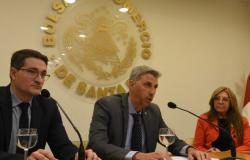The governor of La Rioja, Ricardo Quintela, confirmed this Tuesday that starting in July the Debt Cancellation Bonds (Bocade) will begin to circulate in the province, the local quasi-currency approved last January by the provincial Legislature.. In this sense, Quintela explained that the first to receive part of his salaries in local currency will be the highest-ranking officials, for example, himself and his deputy governor.
“The circulation of Debt Cancellation Bonds will begin in July. The first to receive part of their salary in this way will be the highest-ranking officials: governor, vice-governor, ministers, secretaries and undersecretaries will receive 100 thousand pesos of their total salary with Bocade, while the general directors will receive 50 thousand pesos,” the Rioja governor specified in a post in X.
Next, Quintela asked the Judicial and Legislative Function and members of the Court of Accounts to implement the same measure with officials, deputies and judges of the TSJ (Superior Court of Justice). “For the rest of the workers, in the month of August we will make the single payment of a Bonus of 50 thousand pesos that will be paid in Bocade,” anticipated the provincial leader.
Meanwhile, Quintela indicated that the province will grant “an increase in the settlement of the Complementary Annual Salary (SAC [medio aguinaldo]) that will be paid in the month of July, adding non-remunerative items that were previously excluded from the workers’ SAC.” “Thus we reaffirm our commitment to value the work and salary of those who provide services in the State, contributing to consumption and the economic reactivation of the province,” he concluded.
The Rioja quasi-currency project
It should be remembered that the project of the Rioja ruling party to create the Bocade had been approved on January 18 in the local Legislature. The provincial quasi-currency bears the name “El Chacho”, in honor of the leader Ángel Vicente Peñaloza. At that time, Quintela justified the issuance of the Rioja quasi-currency under the argument that it is a “forced” measure in the face of “the cruelty of the adjustment” applied by the government of Javier Milei.
The initiative was approved by a majority during the 16th extraordinary session of the Legislature. At the time of its sanction, it was estimated that around $15,000 million of Bocades would be issued with denominations of $1,000; $2,000; $5,000; $10,000 and $50,000. This quasi-currency would be used to cover 30% of the salary of public administration workers, while the remaining 70% will be collected in pesos.
In addition, the Bocade would have circulation in businesses in La Rioja and would be used to pay taxes, coming into effect in 45 days. Both the municipal State, companies and decentralized, self-sufficient entities are obliged by regulation to accept the quasi-currency “in total or partial cancellation of their money credits,” indicates the project document.

After the Bocade sanction, La Rioja announced local default
Days after the Bocade sanction, Quintela himself announced that La Rioja was unable to pay its debt in dollars. The debt in question corresponded to a “green” bond issued in 2017, for a total of US$ 200 million, intended to finance the Wind Farm. Given this, the provincial Ministry of Finance issued a statement detailing the situation.
“The government of the province of La Rioja reports that it faces limitations in its ability to pay principal and interest… under international bonds maturing in 2028.” The Rioja Executive attributed this situation to “unprecedented economic challenges”, placing emphasis on economic contraction, high inflation and the devaluation of the exchange rate.









